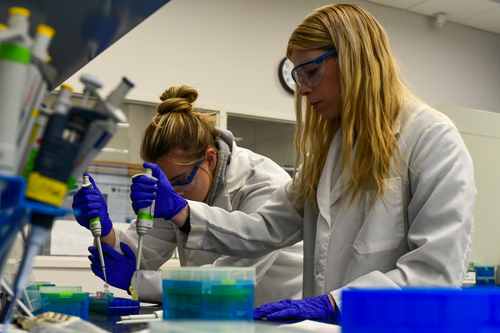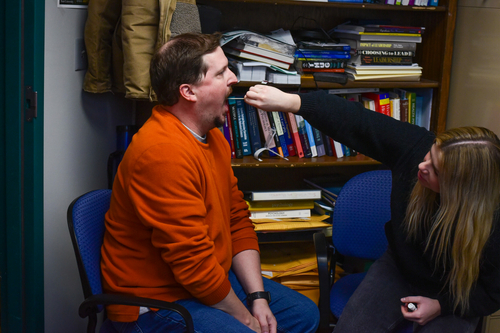Can gratitude reduce physical pain? Spearfish researcher wants to find out

People in pain might benefit from practicing gratitude, according to a professor who has studied gratitude for nine years at Black Hills State University (BHSU).
Nathan Deichert, professor of psychology at BHSU, and a group of five undergraduate students are studying if more grateful physical therapy patients feel less severe pain, or if pain interferes less in their sleep, movement, work and other daily activities.
If the group finds a connection, a writing-based gratitude practice might be a low-cost way to help people recovering from surgeries, physical therapy patients or those in too much pain to attend physical therapy, Deichert said.
“On the pain scale of 1–10, if you’re at an 8, you’re not going to go from an 8 to a 0. But, if you go from an 8 to a 7, that’s a good thing,” he said.
Forty-four patients from the Spearfish area have participated in the study since July. Deichert hopes to involve at least 130 patients by the end of the study next year.
Each patient fills out a collection of surveys about their pain, tendency to feel gratitude, stress, coping strategies and the level of support in their lives. To add genetic context, one DNA sample is also collected from each patient using a cheek swab.

DNA samples will reveal if patients with one genetic variation show a stronger relationship between gratitude and pain than those with another. The gene, called COMT, is commonly associated with pain, stress and anxiety.
Early survey results don’t show a correlation between gratitude and physical pain. But more grateful patients experienced less stress and more social support. They also didn’t avoid using the painful body part as much.
Deichert expects a relationship between gratitude and pain will emerge if the same trends continue. “I think [the early results] are associated with the fact that we don’t have enough people yet,” he said.
The study is partially funded by an Institutional Development Award from the National Institutes of Health (NIH) designed to support research in states that haven’t received much funding from NIH. Black Hills State University also supports the study with a seed grant.
Deichert intends to submit his findings for presentation at the Rocky Mountain Psychological Association’s annual convention in Albuquerque, New Mexico in April.
How gratitude might affect pain
Gratitude might affect pain by changing how someone thinks and feels, Deichert said.
“There’s a huge psychological component to pain,” Deichert said. “How you appraise things and how you interpret things makes a big deal in your physical experience of pain.”
If someone in pain thinks “this is the worst thing ever. This is never going to end,” he said, “it’s going to probably increase your attention to the pain … and prevent you from doing things that are going to help like physical therapy.” In reverse, gratitude may help by promoting a more positive mindset.
Reduced stress, increased positive thinking and stronger social support are known benefits of gratitude that also affect pain, Deichert said.
Lilian Jans-Beken, Ph.D., who is not involved in the BHSU project, has studied gratitude for eight years. Jans-Beken suspects gratitude could help people cope with their pain by changing the way pain is interpreted in the brain.
She shared a hypothetical example of two people with the same mental illness. One lacks social support, doesn’t have a meaningful routine and experiences anger and pessimism. The other is “flourishing” with a loving family, volunteer commitments and a grateful, optimistic mindset.
“Although both people experience the same illness on the same level, you can imagine that the [flourishing] person lives a nicer life,” she said. “My guess is that this works the same with physical health … gratitude can act as a coping mechanism when experiencing pain.”
Why it’s tricky to predict results
Few researchers have tackled the topic, Deichert said.
“The stuff I have seen — which are only just a few studies — they’re sort of mixed. So, it’s pretty unclear as to whether gratitude has an effect or not,” he said.
A couple of factors could influence the results, he said. The study isn’t limited to one type of pain, for example. Also, each patient takes each survey just once. Without a way to look at results over time, it’s hard to know what is causing what.
“Maybe people who are in less pain have an easier time feeling more gratitude,” Deichert said.
Physical therapists: emotions make a difference
Thoughts and emotions like gratitude cause physical responses that influence how patients recover, said Laura Bonsness, a physical therapist and the founder at About You Physical Therapy in Rapid City.
“You can see differences in rehab sometimes based on peoples’ stories,” she said.

Someone who sprained an ankle just after getting fired from their job may have a different rehab outlook from someone who sprained an ankle after scoring a winning football touchdown, for example. “Oftentimes the neurochemical responses and the resting muscle tension of the individual [who got fired] are heightened up. So within their rehab, there is a tension within that system that is already higher,” she said.
Positive emotions like gratitude might help by calming the nervous system and relaxing muscle tension.
“Gratitude has a similar response to some degree as deep breathing,” she said.
Emotions also heighten the body’s sensitivity to pain, said Rhianna Wickett, who has a doctorate of physical therapy and is an owner and practitioner at Elevate Performance Physical Therapy in Rapid City.
“If someone is experiencing a challenge finding gratitude or other emotional stressors, any smaller pain that the brain might normally not see as an immediate threat might be interpreted as significant pain,” Wickett said
A gratitude journal prescription for patients could be a great idea, she said. But it might be difficult to integrate gratitude practices unless the patient is open to it.
“When peoples’ stress goes up, sometimes it can be hard to find that gratitude within themselves. If it isn’t something they’re naturally in tune with, it could be a challenge,” Wickett said.
Deichert recommends a gratitude practice
Despite his research, Deichert said he isn’t naturally the most grateful person. Still, he tries to practice gratitude in times of stress.
“I definitely have used what I know to do what gratitude does — it changes your perception of things, changes your interpretation of things and just reminds you of the good things that are present,” he said.
Writing or thinking for 5-10 minutes about someone you’re grateful for is a good practice to try a couple of times a week, or whenever the mood strikes you, Deichert said.
For those in pain, Deichert said, gratitude practices may turn out to be a low-cost, low-risk way to ease suffering.
“You don’t have to spend a dime on being grateful. In terms of the cost benefits, I think there’s a huge benefit that could be gained without a lot of cost,” Deichert said.








